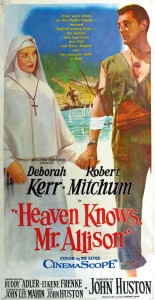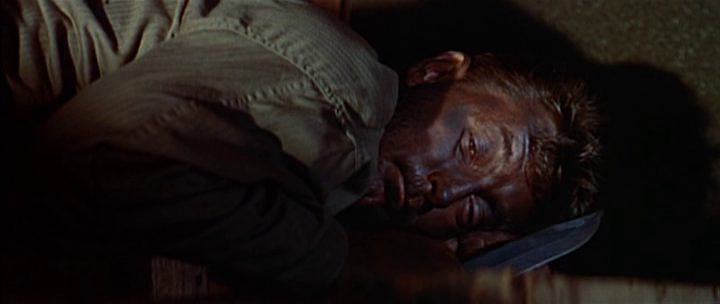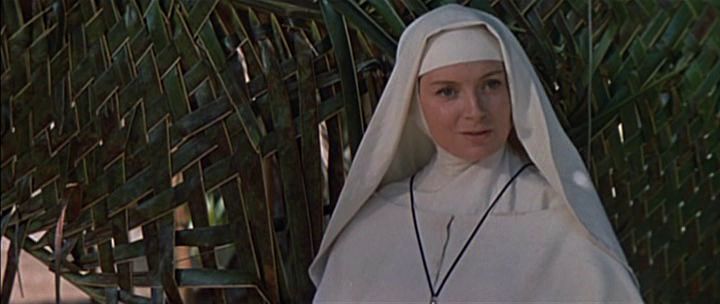|

Synopsis:
During World War II, a Marine (Robert Mitchum) drifts ashore onto a seemingly deserted South Pacific island, where he encounters its lone inhabitant: a stranded nun (Deborah Kerr). As they struggle to survive and devise a plan for escape, they develop a deep fondness for one another — but will Mitchum respect Kerr’s spiritual vows?
|
|
Genres, Themes, Actors, and Directors:
- Deborah Kerr Films
- John Huston Films
- Nuns
- Robert Mitchum Films
- Romance
- Soldiers
- Survival
- World War II
Review:
The first of Deborah Kerr and Robert Mitchum’s on-screen pairings (in 1960, they also co-starred in both The Sundowners and The Grass is Greener) was this unusual “romance” about a Marine and a nun bonding during a time of crisis. Such a scenario (ripe for exploitation, which co-writer/director John Huston masterfully avoids) could easily go in any number of different directions — but what’s so refreshing about this story is its ultimate simplicity. It’s essentially a character-driven relationship piece, set within the chaotic arena of war; other than a few minutes showing a pair of Japanese soldiers interacting with one another (their dialogue isn’t translated), and a couple of solitary lines by soldiers much later in the film, Mitchum and Kerr remain the sole speaking actors in the movie — thus, it’s the evolution of their interactions, coupled with their struggle to survive a seemingly impossible situation, that keeps us glued to the screen.
Mitchum reportedly named this a personal favorite among the many roles he played, and his character here comes across as remarkably sympathetic. We ache for this rough-hewn man — an orphan who found a home with the Marines — as he opens up his heart for the first time to Kerr’s impossibly kind nun. Kerr’s character is a bit more enigmatic (I believe we’re meant to relate to Mitchum as the central protagonist, rather then Kerr), but she does a fine job exhibiting both her enduring spiritual resolve and her growing fondness for Mitchum. Much like in The Nun’s Story (1959) with Audrey Hepburn, we wonder what kind of a decision this beautiful, strong-willed young nun will ultimately make in the face of competing desires.
Note: I’m not especially fond of this film’s title, which makes it sound like a comedy rather than the somewhat serious drama it really is. I understand its deeper meaning (“heaven”, or God, will know what transpires between the nun and Mitchum, even in their seeming isolation), but one can’t help immediately “reading” the title as a whimsical British turn of phrase instead.
Redeeming Qualities and Moments:
- Robert Mitchum as Corporal Allison

- Deborah Kerr as Sister Angela (a.k.a. “Ma’am”) (nominated by Peary as one of the Best Actresses of the Year in his Alternate Oscars)

- Excellent use of a natural island setting

- A fine, unconventional “love” story

Must See?
Yes, as an enjoyably character-driven film by a master director. Listed as a Personal Recommendation in the back of Peary’s book.
Categories
- Good Show
- Important Director
Links:
|





One thought on “Heaven Knows, Mr. Allison (1957)”
A definite must.
(SPOILER AHEAD)
A story I did not know about this film:
In the original novel, Allison and Sister Angela do fall in love (which I also didn’t know). However, apparently, the Catholic Legion of Decency decided that, whereas they could not stop a book from being published, they could certainly prevent Catholicism from being ‘disgraced’ on-screen. So they sent a representative to be present during filming (!) to make sure the book was not translated faithfully for ‘unsuspecting’ filmgoers. …Frankly, I’m not sure how something like that was even permitted. The Catholic committee organized to rate films was, of course, within its ‘rights’ to rate a film for their flock once it was made – but to dictate how it was to be made? I was unaware that this version of the Hays code wielded such power.
The irony is that, although their intrusion was reprehensible, the end product is probably more powerful than it might have been had Huston stuck to the book. The challenge in writing the screenplay seems to have been: how do we still get under the skin of these two characters – not as an advertisement for God, but for the purpose of rich storytelling?
The result is a resounding success and, yes, it wins through “ultimate simplicity”. Having Sister Angela remain true to her vow presents real conflict (and, if one is paying attention, Sister Angela makes passing reference to the fact that she could possibly end up romantically involved with Allison). But there is something even more interesting and compelling at work (and play): these two develop a bond that will be long-lasting. As Kerr remarks near the end of the film: “No matter how many miles apart we are, or whether I ever get to see your face again, you will be my dear companion always. Always.”
I have rarely been so haunted – and moved – by the closing words of a film. And by the way Kerr says them. (As well, note the delicacy with which Mitchum addresses Kerr before she utters those words.)
I can’t say enough wonderful things about ‘HKMA’. It’s splendid from start (with Georges Auric’s atmospheric opening theme) to finish. Huston’s direction is in fine form and Kerr and Mitchum give two of the best performances of their careers.
A film that most certainly holds up well to repeat viewings. You will definitely want to spend time in the company of these two souls again. Rich, rewarding, tense, funny, and an altogether endearing piece of cinema!